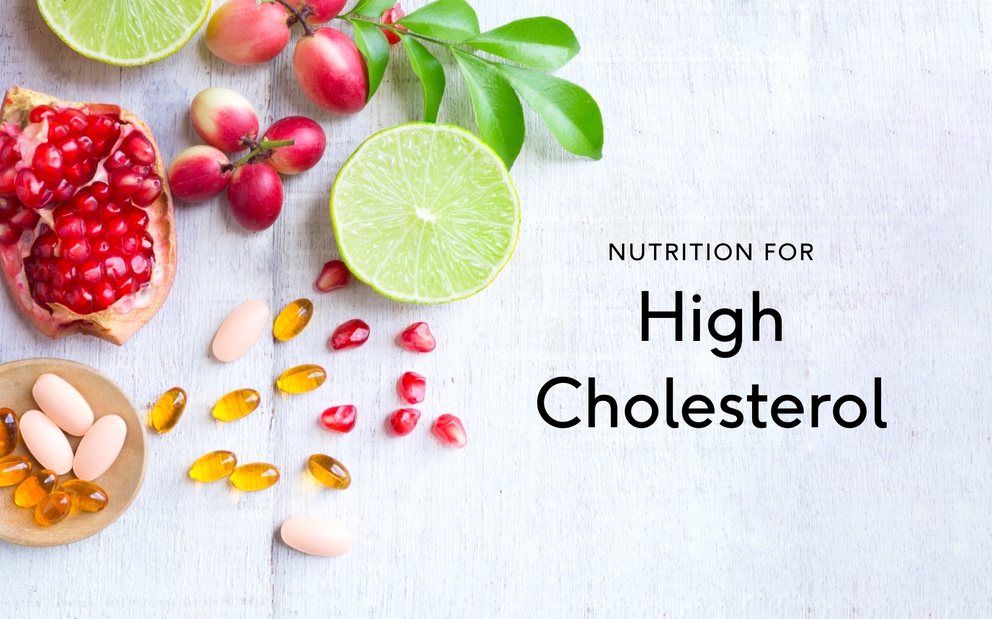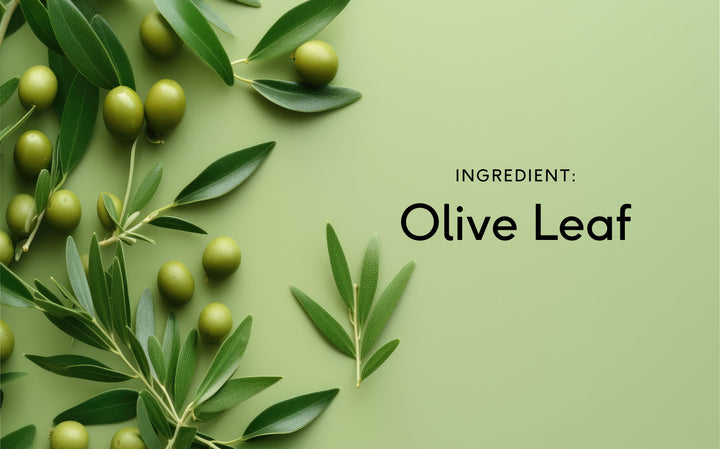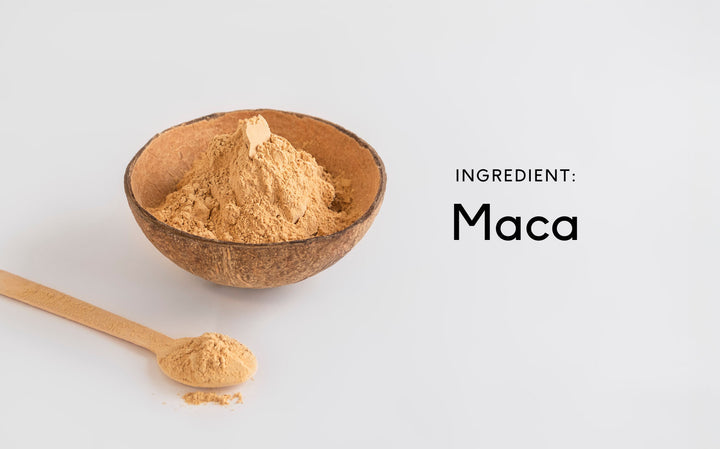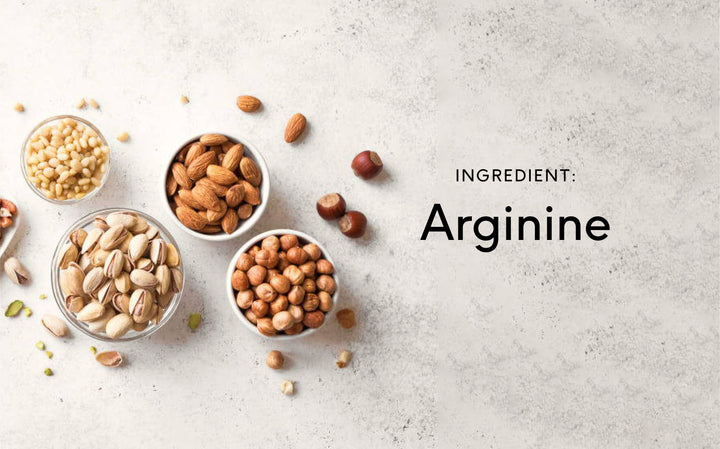Best Vitamins for High Cholesterol [2025 Nutritionist Reviewed]
Maya has completed an MSc in Advanced Complementary Medicine and specialises in the management of metabolic syndrome, NAFLD, cardiovascular and other chronic conditions.
Maya has completed an MSc in Advanced Complementary Medicine and specialises in the management of metabolic syndrome, NAFLD, cardiovascular and other chronic conditions.
Table of contents

| What is High Cholesterol classified as? |
Having total cholesterol levels of 5mml/L or above). |
| Consequences of High Cholesterol |
Increases the risk of heart attacks, strokes, atherosclerosis, and restricted blood flow to organs. |
| Factors that may cause High Cholesterol |
Diet high in saturated fat, smoking, sedentary lifestyle, age, ethnicity, genetics. |
| Prescribed medication for reducing High Cholesterol |
Statins - Atorvastatin (Lipitor), Fluvastatin (Lescol), Pravastatin (Crestor), Simvastatin (Zocor) |
| What Vitamins can help reduce High Cholesterol |
Vitamin B3 (Niacin), Vitamin D, Vitamin E, and Vitamin C |
| What additional ingredients can help reduce High Cholesterol |
Soluble Fibre, Omega-3, Plant sterols, Soya, Red yeast rice, Berberine, Ginger, Green tea |
1. What is Cholesterol made of?
Cholesterol is a fatty substance that is found in all the cells in your body and is digested from the foods we eat, and is also naturally produced in the liver. It combines with proteins to form Lipoproteins. Cholesterol is needed for functions like producing hormones and digestion1, 2.
Having a high cholesterol level (total cholesterol level of 5mml/L or above) means there is more cholesterol than normal in your blood, and this can increase your risk of heart attack and stroke by causing atherosclerosis or a build-up of fatty plaques in the arteries, restricting the flow of blood to the organs1,3.
There are two types:
HDL (High-density Lipoprotein)- is known as ‘good’ cholesterol as it helps remove the ‘bad’ cholesterol from your blood by taking it to the liver, where it is broken down and removed from your body. Normal levels are 1mmol/L or above.
LDL (Low-density Lipoprotein) or non-HDL- this is the ‘bad’ cholesterol, and if there is too much in the bloodstream, fatty deposits build up in the blood vessels causing narrowing. Normal levels are 4mmo/L or below.
Cholesterol screening is important to identify problems early and NHS healthcare checks including blood pressure and blood sugar are offered for those over 40 years of age.
If you are concerned about your cholesterol levels, see your local GP and request a cholesterol blood test, sometimes referred to as a ‘lipid profile’1, 3.
2. What are the risk factors for High Cholesterol
Dietary
Animal based proteins such as egg yolks, meat, and cheese contain cholesterol, however more importantly, one of the main contributors to high cholesterol is eating too much saturated fat e.g. oils, lard, butter, red meat, and fried foods, which then reduce the liver’s ability to remove cholesterol.
Lifestyle
Smoking - stopping smoking is one of the most important lifestyle factors to help reduce your risk of heart disease, stroke, respiratory illness, and cancer.
Low levels of exercise- moderate physical activity such as walking, swimming, and cycling will improve your wellness, overall fitness, and cardiovascular health.
A heart-healthy balanced diet, with less fat - particularly trans fats, and consuming plant-based foods is important. High fibre intake with plenty of fruit and vegetables will help reduce the risk of constipation and help lower cholesterol and blood pressure4.
Age
Cholesterol is more likely to be higher as we age.
Ethnicity
Ethnicity- South Asian people are at higher risk.
Genetics
Males are more likely to have high cholesterol. Familial Hypercholesterolemia is an inherited condition meaning it can be passed on in families and leads to high cholesterol and cardiovascular disease1, 2.
3. What is the treatment for High Cholesterol?
Sometimes, if high cholesterol cannot be reduced by diet and lifestyle changes alone, your doctor may recommend prescription medications to lower your cholesterol to safe levels such as statins.
Statins are oral tablets that lower the cholesterol in your bloodstream and protect the blood vessel walls. They are one of the most common drugs prescribed in the UK. If your GP or cardiologist thinks you need a statin, they will find the right one for you, depending on your medical history and your cholesterol level.
Types of statins include:
- Atorvastatin (Lipitor)
- Fluvastatin (Lescol)
- Pravastatin (Crestor)
- Simvastatin (Zocor)
If statins are not right for you, other medicines can be used to lower cholesterol such as:
- Oral tablets – Ezetimibe, Fibrates, Bile Acid Sequestrants (also called Resins), and Bempedoic Acid
- Injections – Alirocumab, Evolocumab and Inclisiran1, 2
The American Heart Association Guidelines state that statins are recommended for most people with high cholesterol who have significant risk factors for cardiovascular disease. Statins continue to provide the most effective lipid-lowering treatment in these cases5.
4. What vitamins are good for High Cholesterol?
Vitamin B3 (Niacin), Vitamin D, Vitamin E, and Vitamin C have been researched and thought to help lower cholesterol.
5. Can vitamins help with High Cholesterol?
Research shows Vitamins B, D, E and C have the potential to help lower cholesterol6
B Vitamin (Niacin)
Niacin is a B-complex vitamin that has been shown to be effective in raising HDL levels7.
Vitamin C
Vitamin C has been found to help lower LDL cholesterol and triglyceride levels16.
Vitamin D
Vitamin D is essential for good bone health, and cholesterol plays a role in producing vitamin D from sunlight. Vitamin D also has a role in the immune system and heart health8.
Vitamin E
Vitamin E is one of the most important fat-soluble anti-oxidants and reduces atherosclerosis plaques and the risk of heart attacks9.
6. How do vitamins improve Cholesterol levels?
Vitamin D supplementation helps reduce total cholesterol, LDL, and triglycerides. Vitamin D may be useful for people with vitamin D insufficiency and high cholesterol who are at high risk of cardiovascular disease10.
Vitamin E helps prevent damage from lipid (fat) peroxidation (breakdown.)7
Niacin has anti-sclerotic properties meaning helps prevent plaque build-up in the blood vessels and in turn it helps raise the levels of HDL (‘good cholesterol’) and lower triglycerides and non-HDL (‘bad’ cholesterol)11.
7. Does Cholesterol need vitamins?
Vitamin D is linked to cholesterol because we need cholesterol in skin cells to make Vitamin D from sunlight, and Vitamin D is later processed in the liver and kidneys8.
8. Why do vitamins for High Cholesterol work?
Niacin may stop the body from breaking down fats and help degrade harmful lipids and reduce liver triglyceride synthesis and LDL secretion by directly acting on the cell receptors12, 13.
Vitamin E protects the integrity of cell membranes7.
Vitamin D appears to have a beneficial effect on reducing serum cholesterol levels and improving lipid profiles and this is thought to be because of its effect on reducing cholesterol absorption14, 10, 15.
Vitamin C does not specifically lower cholesterol levels, but evidence suggests it may help protect major arteries against damage and help reduce the risk of cardiovascular disease16.
9. What additional nutrients can improve High Cholesterol?
A healthy diet is the first step to heart health but there are many over-the-counter dietary supplements and natural health products that have health benefits including cholesterol-lowering properties as shown in clinical trials17. These are the best supplements to take for cholesterol-lowering.
Soluble Fibre and Psyllium
Soluble fibre helps lower cholesterol absorption in your body, and psyllium is a type of fibre derived from the husks of the seeds of Plantago Ovata plant. It can be taken as a pill or as a powder that can be mixed into drinks or food. It can help with constipation but too much can cause bloating6, 11.
Omega 3s
Omega-3s have been shown to improve HDL cholesterol levels. Oily fish and fish oil supplements are a good source of healthy unsaturated fats, specifically omega-3s. Dietary recommendations are to have two portions oily fish per week. Tinned, frozen, or fresh all count e.g. salmon, sardines, pilchards, trout, herring, and mackerel6, 11.
Flax is a blue flower that is grown in temperate climates, and both the flaxseeds and oil are good sources of Omega-3 fatty acids.
Phytosterols and Stanols
Phytosterols and Stanols (plant sterols) are waxes that are derived from plants. They help prevent your intestines from absorbing cholesterol in your body. They are naturally present in foods such as whole grains, nuts, fruits, and vegetables. Food manufacturers are now adding them to certain foods such as margarine and yoghurt. There is good evidence of the benefit of eating plant-based foods containing Phytosterols and Stanols for lowering LDL cholesterol levels 6,11,19, 29.
Soya Protein
Eating tofu, soya milk, and steamed soybeans can reduce the saturated fat and cholesterol in your diet. Studies have reported a reduction in total and LDL cholesterol after adding soy protein to diets that are low in saturated fat and cholesterol. Experts have recommended an intake of soy protein of around 25g-40g a day19.
Red Yeast Rice
Is a product of the yeast Monascus purpureus which is grown on white rice. It is a commonly consumed dietary staple in Asia and has been used in Traditional Chinese Medicine.15 There are some Red Yeast Rice supplements available for lowering cholesterol containing a substance called monacolin K which has a similar chemical makeup to Lovastatin30. There is variability in quality between manufacturers and monacolin K can cause the same type of side effects as Lovastatin (e.g. damage to muscles, kidneys, and liver.) This has led the United States Food and Drug Administration (FDA) to rule that any products containing monacolin K are unapproved and cannot be sold legally as supplements11.
Berberine
Berberine is a bitter-tasting and yellow-coloured chemical found in some plants like European Barberry, Goldenseal, Goldthread, Oregon Grape, Phellodendron, and Tree Turmeric.
Studies have shown Berberine can help regulate glucose and lipid metabolism and has the potential for the treatment of diabetes and high cholesterol20.
Ginger
There is some evidence to show that Ginger can lower your total cholesterol and triglycerides and reduce LDL cholesterol and boost HDL cholesterol6.
Green Tea
A meta-analysis from the American Journal of Clinical Nutrition suggests that Green Tea significantly reduces total cholesterol, including LDL. Herbal Rooibos (redbush) may also help improve your lipid profile or levels of cholesterol in the blood11, 20.
10. When is best to take vitamins for High Cholesterol?
Water-soluble vitamins e.g. Niacin and Vitamin C can be taken with or without food and at any time of day. Fat-soluble vitamins e.g. Vitamins E and D depend on fat for proper absorption so it’s generally recommended to take fat-soluble compounds with a meal that contains some fat21.
11. How much vitamins and minerals do I have to take for healthy Cholesterol levels daily?
The dosage of Niacin that a doctor may recommend for high cholesterol is:
- 500–3000 mg a day orally, divided into two to three doses
The recommended daily intake (RNI) of Niacin is 14mg a day for women and 16mg a day for men6.
A 500mg/day dose of vitamin C for a minimum of four weeks resulted in a significant decrease in serum LDL and triglyceride levels in the study participants. Adults aged 19 to 64 need on average 40mg of vitamin C a day22.
The amount of vitamin E you need daily is:
- 4-15 mg a day for men
- 3-15 mg a day for women
Generally 50-200mg dose a day is regarded as safe for supplementation22.
Vitamin D recommended dosage is 10mcg of vitamin D for adults. This will sometimes be written as 400IU (international units)23.
As with all over-the-counter medications, it is always best to seek medical advice and to speak to your doctor or healthcare provider before starting any supplements.
12. Can vitamin deficiency cause Cholesterol problems?
Low Vitamin D levels have been linked to high cholesterol and triglyceride levels24.
13. Is bad Cholesterol a sign of vitamin deficiency?
There is a relationship between Vitamin D deficiency as those with low Vitamin D levels tend to have raised cholesterol but so far the cause-and-effect relationship has not been proven25.
14. What vitamins should I take to prevent High Cholesterol?
There is good evidence from systematic reviews for Vitamin D supplementation for cholesterol-lowering, particularly if you are in the high-risk category for Vitamin D deficiency10, 8, 22.
During the autumn and winter, you need to get Vitamin D from your diet because the sun is not strong enough for the body to make Vitamin D. The Department of Health and Social Care recommends that adults and children over four years old take a daily supplement22, 10.
Doctors sometimes recommend taking Niacin supplements for patients with high cholesterol and an increased risk of heart disease6, 26, 27.
15. Where to buy vitamins for High Cholesterol?
Pharmacies, supermarkets and online Vitamin and Supplements stores such as WeAreFeel.
16. How long does it take for vitamins to work for High Cholesterol?
This depends on factors such as the current health of the person taking it, whether they are taking any prescribed medication such as Statins, and the dosage. For example, Niacin therapy without any other cholesterol medication lowered total and LDL cholesterol and increased HDL over a period of 16 weeks. It may take up to three months to see the effect of Vitamin supplementation on cholesterol levels28.
17. Possible side-effects of taking vitamins for High Cholesterol?
It is always important not to exceed the maximum recommended daily intake of vitamin supplements unless directed by a doctor.
Niacin overdose can cause adverse symptoms such as itching, nausea, headache, vomiting, light-headedness, and epigastric pain19, 23.
Taking large amounts (more than 1,000mg per day) of vitamin C can cause stomach pain and diarrhoea. Taking less than 1,000mg of vitamin C supplements a day is unlikely to cause any harm22.
Taking high-dose Vitamin D supplements over a long period of time can cause too much calcium to build up in the body (hypercalcaemia) which weakens bones and damages the kidneys and the heart. Do not exceed 100 micrograms (4,000 IU) of Vitamin D22.
There is not enough evidence to know what the effects might be of taking high doses of Vitamin E supplements each day. However, it is stored in the liver so if we have too much, it is possible high doses may impair liver function22.
References
1 https://www.bhf.org.uk/informationsupport/treatments/statins#ares
3 https://www.nhs.uk/conditions/high-cholesterol/medicines-for-high-cholesterol/
4 https://restless.co.uk/health/healthy-body/tips-to-help-lower-cholesterol/
6 https://www.healthline.com/health/high-cholesterol/natural-cholesterol-reducers#niacin
7 https://pubmed.ncbi.nlm.nih.gov/22217984/
8 https://www.heartuk.org.uk/low-cholesterol-foods/vitamin-d
9 https://pubmed.ncbi.nlm.nih.gov/22217984/
10 https://pubmed.ncbi.nlm.nih.gov/31407792
12 https://www.webmd.com/cholesterol-management/supplements
14 https://pubmed.ncbi.nlm.nih.gov/36337630/
16 https://www.mountsinai.org/health-library/supplement/vitamin-c-ascorbic-acid
17 https://pubmed.ncbi.nlm.nih.gov/28133369/
18 https://pubmed.ncbi.nlm.nih.gov/29859248/
19 https://www.ahajournals.org/doi/10.1161/01.CIR.102.20.2555
21 https://www.healthline.com/nutrition/best-time-to-take-vitamins#fat-soluble-vitamins
22 Vitamins and minerals - Vitamin C - NHS (www.nhs.uk)
23 https://examine.com/supplements/vitamin-e/
25 https://www.healthline.com/health/high-cholesterol/vitamin-d-relationship#vitamin-d-and-cholesterol
26 https://pubmed.ncbi.nlm.nih.gov/12873710/
27 https://pubmed.ncbi.nlm.nih.gov/23619367/
29 https://www.scielo.br/j/abc/a/Lzw5HRYHkYZQtBPwbp5mSwB/?lang=en
30 https://www.nccih.nih.gov/health/red-yeast-rice










































 Back
Back





